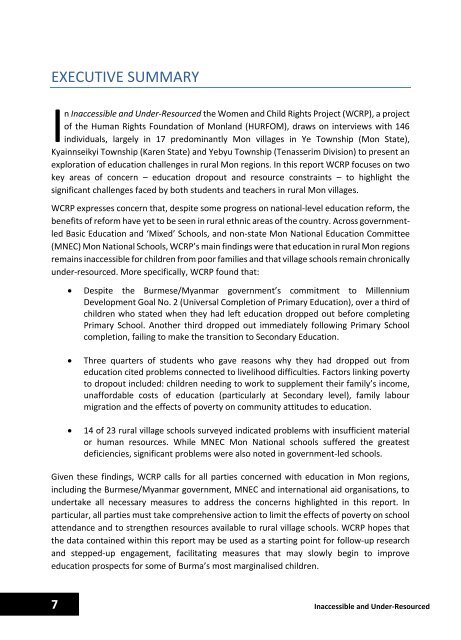Final-Edition
Final-Edition
Final-Edition
You also want an ePaper? Increase the reach of your titles
YUMPU automatically turns print PDFs into web optimized ePapers that Google loves.
EXECUTIVE SUMMARY<br />
I<br />
n Inaccessible and Under-Resourced the Women and Child Rights Project (WCRP), a project<br />
of the Human Rights Foundation of Monland (HURFOM), draws on interviews with 146<br />
individuals, largely in 17 predominantly Mon villages in Ye Township (Mon State),<br />
Kyainnseikyi Township (Karen State) and Yebyu Township (Tenasserim Division) to present an<br />
exploration of education challenges in rural Mon regions. In this report WCRP focuses on two<br />
key areas of concern – education dropout and resource constraints – to highlight the<br />
significant challenges faced by both students and teachers in rural Mon villages.<br />
WCRP expresses concern that, despite some progress on national-level education reform, the<br />
benefits of reform have yet to be seen in rural ethnic areas of the country. Across governmentled<br />
Basic Education and ‘Mixed’ Schools, and non-state Mon National Education Committee<br />
(MNEC) Mon National Schools, WCRP’s main findings were that education in rural Mon regions<br />
remains inaccessible for children from poor families and that village schools remain chronically<br />
under-resourced. More specifically, WCRP found that:<br />
Despite the Burmese/Myanmar government’s commitment to Millennium<br />
Development Goal No. 2 (Universal Completion of Primary Education), over a third of<br />
children who stated when they had left education dropped out before completing<br />
Primary School. Another third dropped out immediately following Primary School<br />
completion, failing to make the transition to Secondary Education.<br />
<br />
<br />
Three quarters of students who gave reasons why they had dropped out from<br />
education cited problems connected to livelihood difficulties. Factors linking poverty<br />
to dropout included: children needing to work to supplement their family’s income,<br />
unaffordable costs of education (particularly at Secondary level), family labour<br />
migration and the effects of poverty on community attitudes to education.<br />
14 of 23 rural village schools surveyed indicated problems with insufficient material<br />
or human resources. While MNEC Mon National schools suffered the greatest<br />
deficiencies, significant problems were also noted in government-led schools.<br />
Given these findings, WCRP calls for all parties concerned with education in Mon regions,<br />
including the Burmese/Myanmar government, MNEC and international aid organisations, to<br />
undertake all necessary measures to address the concerns highlighted in this report. In<br />
particular, all parties must take comprehensive action to limit the effects of poverty on school<br />
attendance and to strengthen resources available to rural village schools. WCRP hopes that<br />
the data contained within this report may be used as a starting point for follow-up research<br />
and stepped-up engagement, facilitating measures that may slowly begin to improve<br />
education prospects for some of Burma’s most marginalised children.<br />
7 Inaccessible and Under-Resourced


